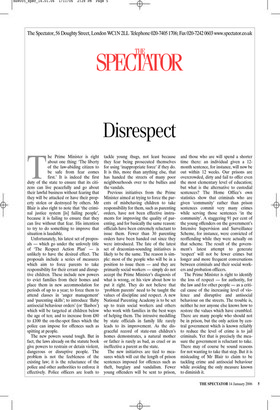Disrespect
The Prime Minister is right about one thing: ‘The liberty of the law-abiding citizen to be safe from fear comes first.’ It is indeed the first duty of the state to ensure that its citizens can live peacefully and go about their lawful business without fearing that they will be attacked or have their property stolen or destroyed by others. Mr Blair is also right to note that ‘the criminal justice system [is] failing people’, because it is failing to ensure that they can live without that fear. His intention to try to do something to improve that situation is laudable.
Unfortunately, his latest set of proposals — which go under the unlovely title of ‘The Respect Action Plan’ — is unlikely to have the desired effect. The proposals include a series of measures which aim to force parents to take responsibility for their errant and disruptive children. These include new powers to evict families from their homes and place them in new accommodation for periods of up to a year; to force them to attend classes in ‘anger management’ and ‘parenting skills’; to introduce ‘Baby antisocial behaviour orders’ (or ‘Basbos’) which will be targeted at children below the age of ten; and to increase from £80 to £100 the on-the-spot fines which the police can impose for offences such as spitting at people.
The new powers sound tough. But in fact, the laws already on the statute book give powers to restrain or detain violent, dangerous or disruptive people. The problem is not the feebleness of the existing law; it is the reluctance of the police and other authorities to enforce it effectively. Police officers are loath to tackle young thugs, not least because they fear being prosecuted themselves for using ‘inappropriate force’ if they do. It is this, more than anything else, that has handed the streets of many poor neighbourhoods over to the bullies and the vandals.
Previous initiatives from the Prime Minister aimed at trying to force the parents of misbehaving children to take responsibility for them, such as parenting orders, have not been effective instruments for improving the quality of parenting, and for basically the same reason: officials have been extremely reluctant to issue them. Fewer than 30 parenting orders have been handed out since they were introduced. The fate of the latest set of draconian-sounding initiatives is likely to be the same. The reason is simple: most of the people who will be in a position to issue them — and they are primarily social workers — simply do not accept the Prime Minister’s diagnosis of what is wrong, or his view about how to put it right. They do not believe that ‘problem parents’ need to be taught the values of discipline and respect. A new National Parenting Academy is to be set up to train social workers and others who work with families in the best ways of helping them. The intrusive meddling by state officials in family life rarely leads to its improvement. As the disgraceful record of state-run children’s homes demonstrates, a natural mother or father is rarely as bad, as cruel or as ineffective a parent as the state.
The new initiatives are tied to measures which will cut the length of prison sentences imposed for offences such as theft, burglary and vandalism. Fewer young offenders will be sent to prison, and those who are will spend a shorter time there: an individual given a 12month sentence, for instance, will now be out within 12 weeks. Our prisons are overcrowded, dirty and fail to offer even the most elementary level of education; but what is the alternative to custodial sentences? The Home Office’s own statistics show that criminals who are given ‘community’ rather than prison sentences commit very many crimes while serving those sentences ‘in the community’. A staggering 91 per cent of the young offenders on the government’s Intensive Supervision and Surveillance Scheme, for instance, were convicted of reoffending while they were actually on that scheme. The result of the government’s latest attempt to generate ‘respect’ will not be fewer crimes but longer and more frequent conversations between criminals and their social workers and probation officers.
The Prime Minister is right to identify the loss of respect — for authority, for the law and for other people — as a critical cause of the increasing level of violence and disruptive and antisocial behaviour on the streets. The trouble is, neither he nor anyone else knows how to restore the values which have crumbled. There are many people who should not be in prison, but the only action by central government which is known reliably to reduce the level of crime is to jail criminals. Yet that is precisely the measure the government is reluctant to take. There may of course be sound reasons for not wanting to take that step. But it is misleading of Mr Blair to claim to be tackling crime and antisocial behaviour while avoiding the only measure known to diminish it.














































 Previous page
Previous page